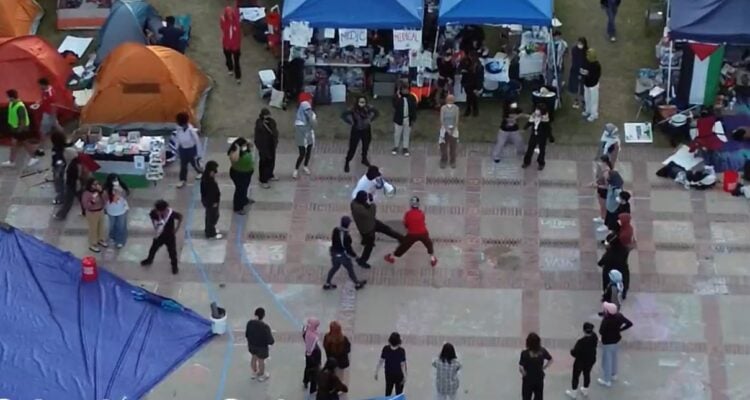Jewish students were barred from walking near or through the UCLA encampment on their way to class unless they denounced the Zionist component of their Jewish identities.
By Dion J. Pierre, The Algemeiner
The University of California (UC) system has announced a ban on encampments, a major policy decision aimed at preventing student protesters from illegally occupying and living on school property in the wake of the anti-Israel demonstrations of this past spring semester.
Writing in a mass email, UC President Michael Drake said officials will uphold the “freedom to express diverse viewpoints” while enforcing “policies impacting expressive activities, including policies that prohibit camping or encampments, unauthorized structures, restrictions on free movement, masking to conceal identity,” and disobeying lawful orders to present identification.
Drake added, “Some of this work has already begun, and you will hear more about it from your campus leadership in the coming weeks. Our ultimate goal is for all of our community members to feel supported in their ability to express themselves, and to pursue their studies, research, patient care, and other work on our campuses. We also want our community members to understand what’s expected of them, including a clear understanding of the principles, policies, and laws that govern our behavior on campus.”
The missive came ahead of a new academic year and followed a tumultuous one in which pro-Hamas demonstrators, including some faculty, upended UC campuses, morphing them into what Jewish students and civil rights groups described as hubs of antisemitic discrimination and support for terrorism.
Setting up “Gaza Solidarity” encampments on school ground was the most disruptive behavior in which the protesters engaged, and universities in some cases protected it.
At UC Los Angeles (UCLA), chancellor Gene Block ordered that an encampment there be protected by physical barriers and campus police, allowing the area to become the site of violent clashes between pro-Hamas and pro-Israel protesters and a zone of nullification in which federal civil rights laws prohibiting the exclusion of individuals based on their racial or religious identity were, according to a US federal judge, flagrantly flouted.
Throughout the encampment’s existence, Jewish students were barred from walking near or through the area on their way to class unless they denounced the Zionist component of their Jewish identities, a policy which UCLA police upheld without compunction.
The federal judge ruled last week that UCLA’s actions violated the law. Drake appeared to be addressing such concerns regarding the “restriction of movement” on UC campuses in Monday’s statement.
UC is not the only higher education system acting preemptively to deter misconduct in the new academic year.
In just the past week, George Washington University suspended Students for Justice in Palestine (SJP) for the entire fall term, Barnard College ordered the arrest of a pro-Hamas protester who made a scene while students moved into their dormitories, and Harvard University mounted signs across its property which explicitly state that “erecting or maintaining a tent or temporary structure” violates school rules.
“An individual who assists others in engaging in a prohibited act will be treated as if they committed the prohibited act themselves,” the signs say.
However, critics argue that such policies may lack teeth, pointing to the dozens of pro-Hamas protesters whose disciplinary charges were dropped over the summer.
Columbia University punished only a few of the students who were involved in occupying an administrative building and staging a riot after vowing to expel them, according to a new report.
Harvard University “downgraded” the disciplinary sanctions it levied against several pro-Hamas protesters it punished for illegally occupying Harvard Yard.
Other students evaded being held accountable by the criminal justice system, according to a July report by The New York Times.
The State Attorney’s Office of Cook County, Illinois dropped criminal charges filed against three Northwestern University faculty and one graduate student who allegedly obstructed law enforcement’s efforts to clear an unlawful demonstration at the Deering Meadow section of campus.
Prosecutors in Travis County, Texas chose not to pursue over 100 charges of criminal trespassing filed against University of Texas at Austin protesters, and 60 other Northwestern University protesters saw their charges dismissed, with prosecutors calling them “constitutionally dubious.”
The Times added, however, that some charges will stick, including those filed against someone who bit a police officer.
Commenting on Columbia University’s amnestying its protesters in a statement issued on Monday, US Rep. Virginia Foxx (R-NC) maintained that protesters must be punished when they violate school rules.
“More than three months after the criminal takeover of Hamilton Hall, the vast majority of the student perpetrators remain in good standing. By allowing its own disciplinary process to be thwarted by radical students and faculty, Columbia has waved the white flag in surrender while offering up a get-out-of-jail-free card to those who participated in these unlawful actions,” she said.
“Breaking into campus buildings or creating antisemitic hostile environments like the encampment should never be given a single degree of latitude — the university’s willingness to do just that is reprehensible.”





